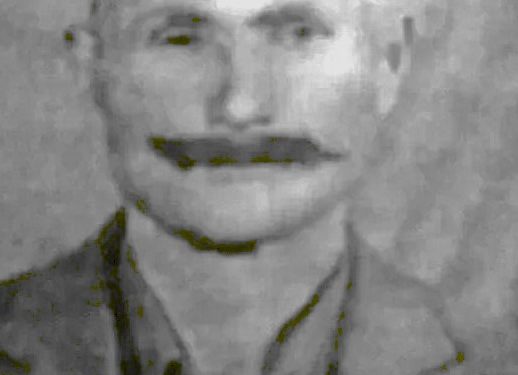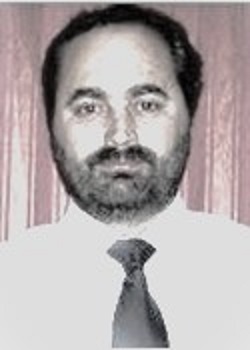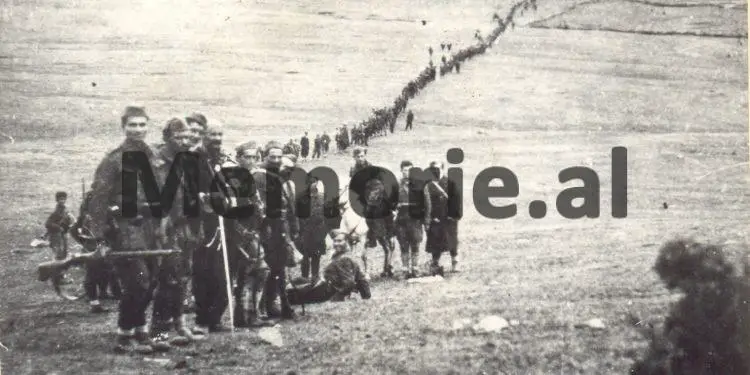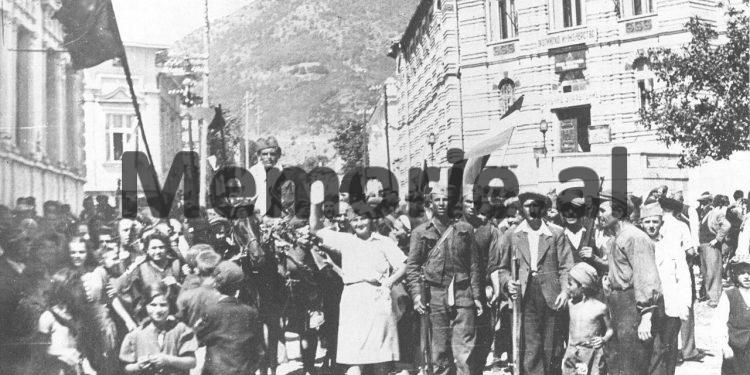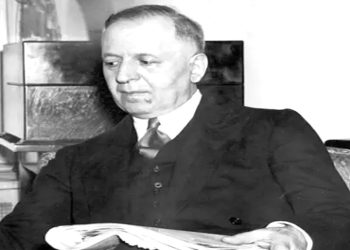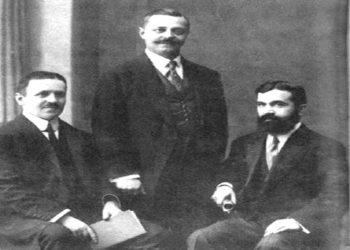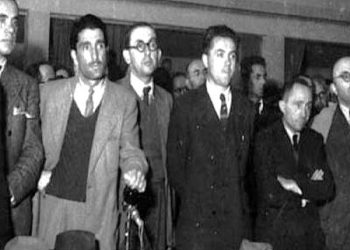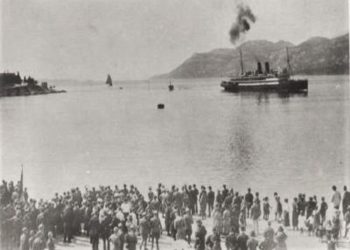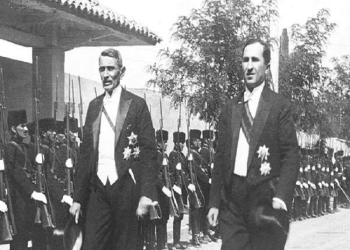Memorie.al / My father, Brahim Sokoli, was born in Lekbibaj-Tropojë, on January 1, 1900, and passed away on August 31, 1991, in Mejë of Kosovo, in the Gjakova region. As a young child, Brahim, along with the other family members of Sokol Ndou, lived in Radoniq of Gjakova in Kosovo, until 1978, when he moved from Radoniq with all his other fellow villagers and settled in Mejë, three kilometers near the city of Gjakova. Brahim was left without his father, Deli Sokoli, at the young age of seven. In 1907, Deli Sokoli set off with a cousin for a family visit to Lekbibaj, to his Paplekaj brotherhood. En route, he encountered an ambush and was treacherously killed by some thugs, who were either paid or coveted his loot.
Brahim, as a seven-year-old, was raised by his mother Zade and his uncles. Very young, he had to take on various manual jobs to become independent and restart his life. Thanks to his diligent efforts, he built a small house, kept livestock for his family needs, and increased his cultivated land every year, either by clearing mountainous land and turning it into farmland, or by purchasing it. As for writing and reading, he had only taken one course in the Serbian language.
He had learned the Cyrillic alphabet and when writing in the Albanian language, he used the Cyrillic letters of the Serbian language. Brahim worked for a time in the “Ereniku” agricultural cooperative in Gjakova. Brahim also lived through a time of great events, from the First World War and the liberation from the Ottoman Empire, to reaching his maturity precisely when the various liberation movements against the new Serbo-Montenegrin occupation and others were very active.
He married Trashë (Bjeshkë) Ndue Kabashi, and together they had nine children whom they raised without any harm. Eight sons and one daughter were raised and educated, all under the care of their parents in conditions that were not very good and which, at the time, the majority of the Albanian population lacked.
Brahim was mobilized several times for corvée (forced labor), to build houses for Serbo-Montenegrin colonists, which, according to the Agrarian “Reform”-which was nothing more than a project to change the demographic structure of Kosovo’s population-was accomplished through various psychological-physical pressures, police torture, and the liquidation of prominent national figures, as well as the co-opting of some religious leaders, by enticing or encouraging them with “religious rights,” only to deter them from national education or inspiration.
The secret Serbo-Turkish agreements, as well as the Greco-Turkish one, were detrimental to the indigenous Albanian population, who were massively displaced to the lands of Anatolia and replaced by a Serbo-Montenegrin population. Brahim, along with his uncle Dedë Sokoli, had even organized the beating of a Serbian engineer who was deceiving Albanians by saying they would work for pay in the construction of houses for the “naseljenici” (settlers), as the Serbo-Montenegrin colonists were called then.
The entire period between the two world wars was just a new, devastating, and unfortunately invisible war, to the detriment of the Albanian population. Various resistance struggles by the so-called “Kaçaks” (outlaws) were waged by the best people of the nation, who were unfortunately pursued, killed, and expropriated according to the so-called agrarian reform.
Their immovable property was usurped by the violently imposed power and given precisely to the extremist Chetniks, who fought the local Albanian population without compromise. With this, they achieved two goals: the depopulation and expropriation of Albanians and the ownership of the most extreme colonizers, who always had Serbian state support and erupted against the Albanian people.
In March 1945, Brahim was mobilized for the “Adriatic” second front, supposedly to pursue the German occupier who was retreating from Yugoslavia. He was mobilized along with several other locals for this “anti-fascist front” and is one of the few who escaped the massacre secretly organized by Yugoslav communists.
They exploited the weakness of the fascist occupying forces and thus, in the name of pursuing this occupier, began to put pressure on Albanians and facilitate the annexation of Kosovo and its incorporation into Yugoslavia.
On the other hand, Albanian communist forces from both sides were aware of this criminal act that was about to happen in Tivar (Bar), but they also viewed this act as settling accounts with the right-wing forces among the Albanians, and according to their assumptions, such forces existed among the population that was not with the National Liberation War. Their mobilization was a shared idea of the communists of Albania and those of Yugoslavia. Regarding this, my father, Brahim, used to tell us:
“They gathered us in Gjakova in a school, near the well (referring to the Higher Pedagogical School). In the courtyard of this school, a neighbor of mine from the village of Radoniq, Ilija Zeqeviq, saw me with many others. He approached the fence and asked me: ‘What are you doing here, Brahim?’ I told him that they had taken me to the city and were saying that we were mobilized.
‘Run away, Brahim, things won’t go well, you have small children,’ and he left, looking around so no one would hear him talking to me. The classrooms were filled with mobilized people; we didn’t even have room to lie down, there were so many of us. The wooden boards smelled of pitch because they had been tarred, so we couldn’t sit, and those who were tired and sat down got their clothes stained. We slept as best we could.
We had some personal weapons with us, not everyone did, but they had promised us that those who didn’t have weapons would be given them. The next day, they took us to Prizren, and there they united us with many, many other mobilized people, from all over Kosovo.
They gathered us in a barracks and took all our weapons, both ours and those of the other Albanians who were partisan soldiers. It was then that suspicion entered our minds that things were not right. The neighbor’s words kept ringing in my head. We had a little hope because we were going to travel through Albania, and we thought they were our people and nothing would happen to us. On the way to Shkodër, they beat us, they killed us, and they didn’t let us rest.
We walked for almost a week. Behind a bush, I saw a young man groaning from his wounds. He had stepped aside to relieve himself, and they had fired a burst of machine-gun fire and left him for dead. I quietly asked him: ‘who shot you, man?!’ ‘The comrades who are escorting us,’ he told me. From his speech, I guessed he was from Drenica. By then, it was understood that they were going to harm us all.
When we passed near a spring, they ordered us not to approach without the command or order of the escorts, who were all Serbs and Montenegrins, called the ‘Bokeška Brigada’ (Boka Brigade). We had to approach only when they allowed us. There was a lot of blood around the spring, and we figured something terrible had happened there. We approached the spring, stepping through the blood of those they had just killed.
They had divided us into groups, and we walked on, tired, unfed, and they didn’t even let us drink water. I saw many young men, and even I myself drank water from the road, because they wouldn’t let us leave the line. When we approached the Buna River near Shkodër, we had to cross on gjemis (boats) and disembark on the other side in groups. It seemed to me that the bridge over Buna was damaged. Some young men had an argument with the Serbo-Montenegrin soldiers and threw two of those soldiers into the river.
While this was happening, other soldiers killed all the mobilized men who were, not only in that boat, but also in five other boats, this was rumored from mouth to mouth. My group had approached the river; they stopped us because we heard the gunshots, and they wouldn’t let us see what was happening. They were afraid we would all rebel, and so we had to act.
To erase the traces, they cleaned the boats of the dead and the blood. It was said that the voices of some of the dead were heard when the Serbo-Montenegrin soldiers threw the living into the Buna River. Eventually, we also crossed the river; the soldiers were enraged and could have killed us without a word.
Thus tired and stressed, we approached Shkodër. In Shkodër, they lined us up at the Castle. A car arrived there with one of the leaders of Albania. When he got out of the car, he shook hands with the Serbo-Montenegrin military officers and told them in a loud voice: ‘This is not what we agreed upon!’ He approached some officers and talked for a while, and later, even though we thought we were saved from ‘our’ escorts, they lined us up, and we set off for Montenegro.
We didn’t know where they were taking us, but they only promised us that they would arm us and we would pursue the German occupiers. When we approached Tivar (Bar), a long column had formed, and it seemed there was no place for everyone, or a trap had been set to kill us.
I was in a group that was near the end of the column. The column had almost dissolved in that locality, which we didn’t even know what it was. When we heard gunshots, we moved quickly along the road, and since we were unarmed, some of us lay down on the ground.
As soon as the guns went off inside that locality, shots also started from outside. They were shooting at us from all sides. The majority, with their hands tied behind their necks, were pushed into a warehouse that we later learned was a tobacco store, and they had killed everyone inside. Many were killed, but some also ran away wherever they could, even into some houses. But the civilians were also armed and shot at us to kill us whenever we approached them.
Before me, several Albanians fell to the ground, hit by the burst of some automatic rifle, whose origin we couldn’t even tell. I also fell down and stayed there for a few minutes, and when I saw that I was not wounded, I ran toward the inhabited houses. Several others who had survived also got up and ran in different directions.
I headed for a house that seemed older to me, with an open yard full of tree trunks. I constantly wondered how I could protect myself from a burst of fire behind those trees. In a zigzag run, I entered the yard; at the end of the yard, there was a small stable. The stable was divided into two parts, and one side was fortunately empty. I went in there and didn’t make a sound. I stayed there for several hours.
Then I set off roughly the way we had come, towards Albania. I felt insecure even though I had moved several kilometers away from the slaughter, from the scene of the event. I decided to spend the night in an old house that looked uninhabited to me. As soon as I sneaked in and entered, I saw some pigs there. I figured someone might come there, but not until morning. One side of my body seemed wet.
I didn’t notice it until the morning, when day began to break. Then I saw it was blood splatters. In the morning, an old woman brought food to the pigs and found me there; she didn’t speak to me at all, even though I said: ‘Dobro jutro majko’ (Good morning, mother), because I was afraid she would scream and they would kill me…! She didn’t speak at all, she was taken aback and looked at me from my feet to the top of my head. She turned her back and left.
I prepared to leave, fearing she might alarm the people of the house. Through a crack in the door, I saw her returning with a coat in her hands. She thrust it into my hands and let me know that if her son came, I would have problems. I put on the coat and prepared to leave. The old woman brought me a piece of bread with a piece of cheese and told me: ‘Beži odavde’ (Get out of here).
She directed me where to go to get out of that town which was in a deadly silence. There was no movement. It took me two weeks to get home, walking the whole way. I never found out where the others had gone,” my father, Brahim Sokoli, recalled.
Brahim Deli Sokoli clearly remembered that when he returned home, they had searched the entire house. It was the time when, since January, Zef Sokoli had deserted from the partisan brigade led by the infamous Malë Sadiku and had joined the brigade of Shaban Polluzha’s fighters. The search was conducted by a platoon of Boka partisan soldiers (“Bokeška Brigada”) and accompanied by some communist activists from the village (Haxhi Misini, etc.).
His wife, Trashë (Mari) Sokoli, or Bjeshka, recalled when the search happened, how they took everything of value and how some of the local activists told her: “Why are you staying here, are you waiting for Brahim to come back, don’t wait for him, take this little boy and go to your father, because he will never return, whose clothes are these you’ve washed, are they Zef’s? They killed him too; don’t wait for him at all!”
From their behavior, one infers that they had heard about the Tivar massacre and that they had surprisingly agreed with the Slavic communist propaganda that supposedly “they were killed as deserters because they had refused to fight against the fascist enemy” and other such things.
On the other hand, the same communist activists had also attacked Zef’s house and taken all his livestock and his entire library. To the question my mother asked, why they were taking his property and books, one of those “spineless” communists replied that: “They are books of that Ballist of the Frashëri family, (referring to Midhat Frashëri) while his livestock, he took them from our Serbian and Montenegrin brothers…! / Memorie.al




